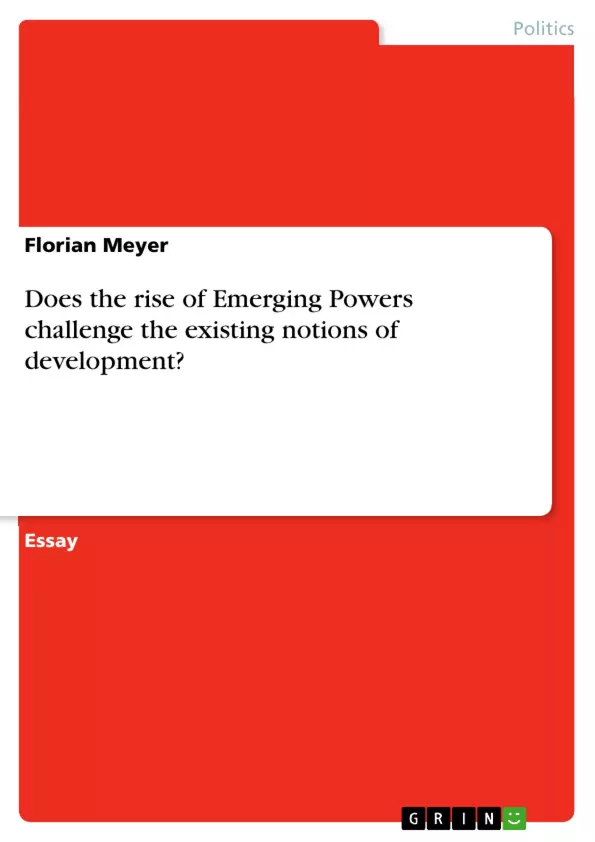With the beginning of the 21st century and the rise of so called new emerging donors within International Development Assistance, questions to what extent these new actors change the existing notions of development in general gained widespread interest among scholars from various academic backgrounds. Ranging from announcements of massive change which will affect the development paradigm as a whole to more nuanced analysis’s of the impact of these newly emerging actors , the academic discourse provides various answers to these questions. The aim of this article will be to examine and analyze the scope and significance of new emerging donors by examining in a first step who these new emerging donors are and what their actual impact on current development assistance looks like. I will argue that the term new emerging donors is misleading in terms of promoting the idea of a coherent group which is actually very diverse and in terms of the fact that these donors are considered to be new, although most of them have a long history in providing aid to other countries.
In a second step, this paper will focus on the example of China as the biggest new emerging donor by examining the underlying principles of Chinese development assistance, differences to the western donor community and the possible impact of Chinese aid on development in general and especially in Africa. I will argue that Chinese aid is largely intertwined with economic self-interests and its national foreign policy, which leads to a mixed picture concerning its outcomes and effects on development in general, although the overall results within the developing countries are rather successful. Furthermore, I will state that the existing flaws within the western development model as well as the situation in many African countries favor the recent success of Chinese aid and made it possible in the first place.
Finally, I will draw a conclusion based on the presented analysis to what extent new emerging donors will change the existing notions of development.
Inhaltsverzeichnis (Table of Contents)
- Introduction
- New emerging donors?
- Chinese Aid and its consequences
- Conclusion
Zielsetzung und Themenschwerpunkte (Objectives and Key Themes)
This article examines the emergence of new emerging donors in International Development Assistance (IDA) and analyzes their impact on existing development paradigms. Specifically, the article focuses on China as the biggest new emerging donor, exploring the principles of its development assistance, its differences from Western donors, and the potential effects of Chinese aid on development, particularly in Africa.
- The rise of new emerging donors and their impact on development practice.
- The nature and characteristics of Chinese development assistance.
- The differences between Chinese and Western approaches to development aid.
- The potential consequences of Chinese aid for development in Africa and beyond.
- The relationship between Chinese aid and its national interests.
Zusammenfassung der Kapitel (Chapter Summaries)
The first chapter introduces the topic of new emerging donors and their impact on development. It argues that the term "new emerging donors" is misleading, as many of these donors have a long history of providing aid. The chapter also outlines the scope and significance of these donors, highlighting the growing role of China as a major player in the field.
The second chapter delves deeper into the specifics of Chinese aid, examining its underlying principles, its differences from Western donor practices, and its potential impact on development. It argues that Chinese aid is largely intertwined with economic self-interest and national foreign policy, resulting in a mixed picture of outcomes and effects on development.
Schlüsselwörter (Keywords)
International Development Assistance, emerging donors, China, development aid, Africa, South-South cooperation, economic self-interest, national interests, Western donor model, aid effectiveness, Paris Declaration.
Frequently Asked Questions about Emerging Powers in Development
How are emerging powers challenging traditional development notions?
Emerging donors, particularly China, introduce alternative aid models that differ from Western paradigms, often focusing on South-South cooperation and mutual economic interests.
Is the term "new emerging donors" accurate?
The term is considered misleading because many of these countries have a long history of providing international aid, and they do not form a single coherent group.
What characterizes China's approach to development assistance?
Chinese aid is often intertwined with its national foreign policy and economic self-interests, yet it has shown significant success in developing countries, especially in Africa.
Why is Chinese aid successful in Africa?
Factors include the perceived flaws in Western development models and the specific needs of African nations that align with China's infrastructure-heavy and non-interference approach.
What is the significance of the Paris Declaration in this context?
The Paris Declaration represents the Western donor model of aid effectiveness, which emerging powers like China often navigate differently or challenge through their own principles.
- Quote paper
- Florian Meyer (Author), 2010, Does the rise of Emerging Powers challenge the existing notions of development?, Munich, GRIN Verlag, https://www.hausarbeiten.de/document/163565


